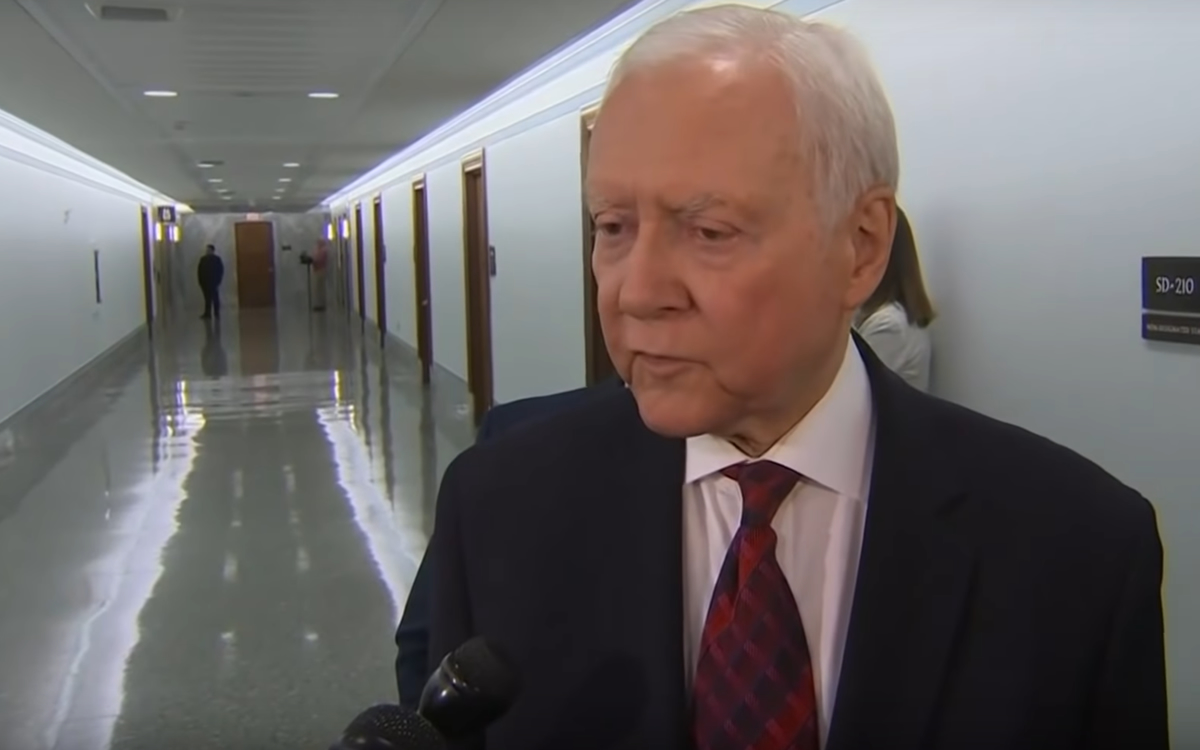Politics
Orrin Hatch dies at 88
Former Utah senator’s LGBTQ rights record was mixed

Former Republican U.S. Sen. Orrin Hatch, who spent over 40 years representing the state of Utah, died on Saturday at the age of 88.
The Orrin G. Hatch Foundation announced that he passed away at 5:30 p.m. MT surrounded by his family. No specific cause of death was given.
Hatch’s Senate career spanned from 1977-2019, longer than any other Republican in the nation’s history.
The senator was best known for his efforts to get the Americans with Disabilities Act and the Children’s Health Insurance Program passed in the Senate and signed into law. He was also known for his committed political philosophy as a fiscal moderate on Capitol Hill within the Republican Party.
The Salt Lake City Tribune noted Sunday reporting on his career:
“In his early years in the Senate, Hatch was seen as a right-wing brawler, fighting for a balanced-budget amendment and laws undermining labor unions. He didn’t earn his deal-making reputation until he struck up a friendship with a liberal lion, late Massachusetts Democratic Sen. Ted Kennedy. Known as the ‘Odd Couple’ in Washington, they teamed to pass the Children’s Health Insurance Program, the first research bill on AIDS and the Americans with Disability Act.”
During a speech on June 17, 1987, then-President Ronald Reagan wryly noted in reference to Hatch and the federal budget; “Let me just say that if every member of the Senate were like Orrin Hatch, we’d be arguing over how to deal with a federal surplus. And that’s why I like to think of Orrin as `Mr. Balanced Budget’.”
His stance on hot button political/cultural issues was extremely conservative. Hatch was strongly opposed to abortion and was the author of the Hatch Amendment to the Constitution that failed to get Senate approval, which stated that there is no constitutional right to abortion and empowered the states to restrict abortion as they saw fit.
On immigration, the senator embraced tougher enforcement immigration policy including expanding the number of Border Patrol officers at the Southern border with Mexico. But he partnered with U.S. Sen. Dick Durbin (D-lll.) introducing the DREAM Act, which would provide a pathway to citizenship for the children of undocumented immigrants, who were children when their parents came to the U.S.
Thus far the legislation has languished even after being reintroduced several times, but has not been approved by majorities in either house of Congress.
On LGBTQ rights Hatch initially took the Republican Party and conservative stance on the issues of equality. At the start of his political rise in Republican politics as a newly elected U.S. senator in 1977, he told students from the University of Utah; “I wouldn’t want to see homosexuals teaching school anymore than I’d want to see members of the American Nazi Party teaching school.
Nine years later in 1996 he supported the Defense of Marriage Act.
Hatch also voted against the Matthew Shepard and James Byrd Jr. Hate Crimes Prevention Act in 2009, which expanded federal hate crime laws to include crimes committed against people based on their gender identity and sexual orientation. During Senate debate over the legislation, he questioned whether it was necessary, suggesting that anti-gay violence was not “a major problem.”
As the country moved towards wider acceptance of same-sex marriage, in 2012, the senator voted to confirm U.S. District Court Judge Robert Shelby to the federal bench in Utah, who then-President Barack Obama had nominated.
Shelby on Dec. 20, 2013, struck down Amendment 3 of Utah’s State Constitution, which defined marriage as a union solely between a man and a woman, opening the way for same-sex marriage in the state.
Shelby ruled that Amendment 3 was in violation of the U.S. Constitution’s 14th Amendment, which guarantees due process and equal protection. As a result Shelby’s ruling set off a series of other district court decisions that overturned bans in several other states.
His ruling was affirmed by the 10th Circuit Court of Appeals on June 25, 2014. On Oct. 6, 2014, the U.S. Supreme Court declined the review the 10th Circuit’s ruling, legalizing same-sex marriage in Utah.
The ruling by Shelby and the effect on the effort to legalize same-sex marriage was noted by Hatch on a Salt Lake City radio show in 2014 saying that, even though he may not like it, legal gay marriage is inevitable:
“Lets face it. Anybody that does not believe that gay marriage is going to be the law of the land just hasn’t been observing what’s going on,” he said on KSL NewsRadio’s “Doug Wright Show.”
“The trend right now in the courts is to permit gay marriage and anybody who doesn’t admit that just isn’t living in the real world.”
Prior to his statements to KSL, in April 2013, Hatch stated publicly that he viewed same-sex marriage as “undermining the very basis of marital law,” but declined to support a federal marriage amendment and endorsed same-sex couples’ right to form a civil union, stating that the law should “give gay people the same rights as married people”
Between January 2012 and February 2014, plaintiffs in Michigan, Ohio, Kentucky and Tennessee filed federal district court cases that culminated in Obergefell v. Hodges.
After all district courts ruled for the plaintiffs, the rulings were appealed to the Sixth Circuit. In November 2014, following a series of appeals court rulings that year from the Fourth, Seventh, Ninth and 10th Circuits that state-level bans on same-sex marriage were unconstitutional, the Sixth Circuit ruled that it was bound by Baker v. Nelson and found such bans to be constitutional. This created a split between circuits and led to a Supreme Court review.
On June 26, 2015, Obergefell overturned Baker and required all states to issue marriage licenses to same-sex couples and to recognize same-sex marriages validly performed in other jurisdictions.
Also in 2013 he was one of only 10 Republican senators who voted in favor of the Employment Non-Discrimination Act, legislation that would have prohibited discrimination in hiring and employment on the basis of sexual orientation and gender identity for those identifying as gay, lesbian, bisexual or transgender. On Nov. 7, 2013, the bill passed the Senate with bipartisan support by a vote of 64–32. Obama supported the bill’s passage, but the House Rules Committee voted against it.
It appeared to political observers and others that as time moved on, the senator was becoming more progressive in his viewpoints regarding LGBTQ people.
In July 2017, after then-President Trump announcement that he ordered a ban on military service for transgender Americans the senator said; “I don’t think we should be discriminating against anyone, transgender people are people, and deserve the best we can do for them.”
In June 2018, the year he retired from the Senate, Hatch gave a speech on the Senate floor expressing his support for the LGBTQ community and drawing attention to the high suicide rates among LGBTQ youth.
“No one should ever feel less because of their gender identity or sexual orientation,” Hatch said. “LGBT youth deserve our unwavering love and support. They deserve our validation and the assurance that not only is there a place for them in this society, but that it is far better off because of them. These young people need us—and we desperately need them.”
********************
Statement by President Joe Biden on the Passing of Former Senator Orrin Hatch
Jill and I and the entire Biden family are saddened to learn of the passing of Orrin Hatch, the longest-serving Senator in Utah’s history, and the longest-serving Republican senator in our nation’s history.
Orrin Hatch once shared in an interview that he had a soft side, and he had a tough side. To serve with Orrin, as I did for over three decades, was to see—and appreciate—both.
He was the fighter who carried with him the memory of his humble upbringing near Pittsburgh, who never humored a bully, or shied from a challenge. The young man who, upon receiving his degree from Brigham Young University, was the first in his family to graduate college; the young lawyer who built a successful law practice; and the senator who sprinted from meeting to meeting because there was so much to do—indeed, when Sen. Hatch retired, he had sponsored or co-sponsored more legislation than any senator at the time.
I saw that energetic, sharp-elbowed Orrin in the many battles we had over tax policy, the right of workers to join a union, and many others.
At the same time, Sen. Hatch was also a man of deep faith; a gentle soul who wrote songs and poems, and shared them with friends, colleagues and the world. This was the Orrin who looked out for the people who often didn’t have a voice in our laws and our country. I saw this in his efforts to pass the Americans with Disabilities Act and the Children’s Health Insurance Program.
When I first launched the Cancer Moonshot as vice president, one of the first visits I made was to the Huntsman Cancer Institute in Salt Lake City, at Orrin’s request. We both saw speeding the pace of cancer research as an issue that transcended political divisions.
When I cast my 10,000th vote in the Senate, Orrin came to the Senate floor and we had a chance to speak. I said that the greatest perk one has as a senator was access to people with serious minds, a serious sense of purpose, and who cared about something. That was Orrin.
He was, quite simply, an American original.
Jill and I send our deepest sympathies to Elaine, and all of the Hatch children, grandchildren, and great-grandchildren.
Former senator Orrin Hatch passes away at 88:
Congress
EXCLUSIVE: Garcia demands answers on deportation of gay Venezuelan asylum seeker
Congressman’s correspondence was shared exclusively with the Blade

U.S. Rep. Robert Garcia (D-Calif.) is demanding answers from the Trump-Vance administration on its deportation of Andry Hernández Romero, a gay Venezuelan makeup artist who was sent to a prison in El Salvador in violation of a federal court order and in the absence of credible evidence supporting the government’s claims about his affiliation with a criminal gang.
Copies of letters the congressman issued on Thursday to Immigration and Customs Enforcement and CoreCivic, a private prison contractor, were shared exclusively with the Washington Blade.
Garcia noted that Hernández, who sought asylum from persecution in Venezuela over his sexual orientation and political beliefs, had entered the U.S. legally, passed a preliminary screening, and had no criminal record.
Pro-bono lawyers representing Hernández during his detention in the U.S. pending an outcome in his asylum case were informed that their client had been removed to El Salvador a week after he failed to show for a hearing on March 13.
Hernández’s family now fears for his safety while he remains in El Salvador’s Terrorism Confinement Center (CECOT), which has a well documented record of human rights abuses, Garcia said.
Additionally, the congressman wrote, while experts say Tren de Aragua does not use tattoos as identifiers, the “primary evidence” supporting Hernández’s deportation based on his supposed links to the transnational Venezuelan gang “appears to have been two crown tattoos labeled ‘Mom’ and ‘Dad,’ which are common cultural symbols in his hometown.”
The determination about his links to or membership in the organization was made by a CoreCivic employee whose criminal record and misconduct as a law enforcement officer led to his termination from the Milwaukee Police Department, Garcia wrote in his letter to the company.
Requesting a response by May 1, the congressman asked CoreCivic President Damon T. Hininger to address the following questions:
- What qualifications and training does CoreCivic require for employees tasked with making determinations about detainees’ affiliations?
- What protocols are in place to ensure that determinations of gang affiliation are based on credible and corroborated evidence?
- How does CoreCivic oversee and review the decisions made by its employees in such critical matters?
- What mechanisms exist to prevent and address potential misconduct?
- What is the nature of CoreCivic’s collaboration with ICE in making determinations that affect deportation decisions? Are there joint review processes?
- What background checks and ongoing assessments are conducted for employees involved in detainee evaluations, particularly those with prior law enforcement experience?
- What guidelines does CoreCivic follow regarding the use of tattoos as indicators of gang affiliation, and how does the company ensure that cultural or personal tattoos are not misinterpreted?
In his letter to Tae D. Johnson, acting director of ICE, Garcia requested answers to the following questions by May 1:
- Did ICE personnel independently review and approve the determination made by CoreCivic employee Charles Cross Jr. identifying Mr. Hernández Romero as a member of the Tren de Aragua gang?
- What evidence, beyond Mr. Hernández Romero’s tattoos, was used to substantiate the claim of gang affiliation?
- Under what legal authority are private contractors like CoreCivic permitted to make determinations that directly impact deportation decisions?
- What vetting processes and background checks are in place for contractors involved in such determinations? Are there oversight mechanisms to ensure their credibility and adherence to due process?
- What guidelines does ICE follow regarding the use of tattoos as indicators of gang affiliation, and how does the company ensure that cultural or personal tattoos are not misinterpreted?
Together with U.S. Rep. Maxwell Frost (D-Fla.), Garcia wrote to U.S. Rep. James Comer (R-Ky.) on Tuesday requesting permission to bring a congressional delegation to CECOT for purposes of conducting a welfare check on detainees, expressing specific concern for Hernández’s wellbeing. The congressmen said they would “gladly include any Republican Members of the committee who wish to participate.”
Hernández’s case has drawn fierce criticism of the Trump-Vance administration along with calls for his return to the U.S.
Influential podcaster and Trump ally Joe Rogan spoke out in late March, calling the deportation “horrific” and “a horrible mistake.”
Last week, California Gov. Gavin Newsom (D) sent a letter to Kristi Noem, secretary of the U.S. Homeland Security, which manages ICE, demanding Hernández’s immediate return and raising concerns with the right to due process amid the administration’s crackdown on illegal immigration.
Hernández “was denied the opportunity to defend himself against unsubstantiated allegations of gang involvement or to present his asylum claim,” the governor wrote. “We are not a nation that sends people to be tortured and victimized in a foreign prison for public relations victories.”
Immigrant Defenders Law Center President Lindsay Toczylowski, who is representing Hernández, has not been able to reach her client since his removal from the U.S., she told NBC News San Diego in a report published April 11.
“Under the Constitution, every single person has a right to due process, and that means they have a right to notification of any allegations the government is making against them and a right to go into court and prove that those allegations are wrong if that’s the case,” she said. “In Andry’s case, the government never gave us that opportunity. In fact, they didn’t even bring him to court, and they have forcefully sent him to El Salvador without ever giving us any notice or without telling us the way that we could appeal their decision.”
“CECOT, this prison where no one has ever left, where people are held incommunicado, is a very dangerous place for someone like Andry,” Toczylowski said.
In March, a DHS spokesperson posted on X that Hernández’s “own social media indicates he is a member of Tren de Aragua,” though they did not point to any specific posts and NBC reported that reviews of his known social media accounts turned up no evidence of gang activity.
During a visit to CECOT in March, Time Magazine photographer Philip Holsinger photographed Romero and reported that the detainee plead his innocence — “I’m not a gang member. I’m gay. I’m a stylist.” — crying for his mother as he was slapped and his head was shaved.
Congress
House Republicans advance two anti-trans education bills
Congresswoman Jahana Hayes, LGBTQ groups slammed the effort

Republicans members of the House Education and Workforce Committee advanced two anti-transgender bills on Wednesday, one that would forcibly out students in public elementary and middle schools to their parents and a second covering grades K-12 that critics have dubbed a “don’t say trans” bill.
More specifically, under the PROTECT Kids Act, changes to “a minor’s gender markers, pronouns, or preferred name on any school form or sex-based accommodations, including locker rooms or bathrooms” could not be made without parental consent, while the Say No to Indoctrination Act would prohibit schools from teaching or advancing “gender ideology” as defined by President Donald Trump’s anti-trans Jan. 20 executive order, Defending Women from Gender Ideology Extremism and Restoring Biological Truth to the Federal Government.
U.S. Rep. Jahana Hayes (D-Conn.), who was named national teacher of the year before her election to Congress, rose to speak out against the bills during the committee’s convening on Wednesday.
“Curriculum does not include teaching students to be something else. Curriculum does not include indoctrinating students to identify as gay or LGBTQ or other or anything. But federal law mandates that all students have civil rights protections,” she said.
The congresswoman continued, “I don’t really understand what the members of this committee think happens in schools, but my question is, what do we do with these children? The children who you are saying, on this committee, don’t exist, the children who are struggling with their identity and often times confide in their teachers and ask for support and help.”
“What we’re doing in this committee is focusing on a small population of students who are at a point in their life where they are struggling and school may, for many of them, feel like the only safe place or the only place where they can get support, or the only place where they can speak to a counselor,” Hayes said.
“And as a teacher, I don’t care if it was just one student that I had to reassure that they were important and they were valued and they belonged here,” she said. “I’m going to do it, and anyone who has dedicated their life to this profession will do the same. So the idea that you all feel okay with arbitrarily erasing, disappearing people, making them think that they they don’t exist, or they don’t have a place in schools, or the curriculum should not include them, or whatever they’re feeling should not be valued, considered, Incorporated, is just wrong.”
“So I will not be supporting this piece of legislation, as if that was not already evident, and I will be using all of my time, my agency, my energy, my advocacy, to ensure that every student,” Hayes said, “feels valued, respected, important and included in the work that I engage in on this committee.”
The congresswoman concluded, “when you are in a classroom and you are a teacher, and that door closes and a student falls in your arms and says to you, I am struggling, and I can’t go home with this information, and I need Help, you have a moral responsibility to help that child or you are in the wrong profession. I yield back.”
The Congressional Equality Caucus slammed the bills in an emailed statement from the chair, U.S. Rep. Mark Takano (D-Calif.), who noted that the legislation comes as “Donald Trump is illegally trying to dismantle the Department of Education and pass tax cuts for billionaires.”
“Extreme Republicans in Congress are trying to distract Americans by advancing cruel, anti-trans legislation,” said the congressman, who is gay. “School districts, teachers, and staff best understand how to draft age-appropriate, inclusive curriculums and craft policies that both respect the important role parents play in children’s education and the importance of students’ safety.”
“Yet, Republicans’ Don’t Say Trans Act would cut critical funding for schools if their teachers teach lessons or include materials that simply acknowledge the reality of trans peoples’ existence,” Takano added. “Republicans’ forced outing bill would put kids in danger by requiring schools that want to take certain steps to affirm a transgender student’s identity to forcibly out them to their parents — even if the school knows this will put the student’s safety at risk.”
The caucus also slammed the bills in a series of posts on X.
🚨BAD BILLS ALERT🚨
— Congressional Equality Caucus (@EqualityCaucus) April 9, 2025
Today, the GOP-controlled Education Committee is voting on two anti-trans bills: One to force teachers to out trans students if they want to take certain steps to affirm the students’ identities, and a “Don’t Say Trans” bill.
Here's why we’re opposed: 🧵
The Human Rights Campaign also issued a statement on Wednesday by the organization’s communications director, Laurel Powell:
“Instead of putting our dangerous President in check and tackling the American economy’s free fall, House Republicans showed where their priorities lie — giving airtime to junk science and trying to pass more anti-LGBTQ+ legislation.
“Forcing teachers to ‘out’ trans youth rather than supporting them in coming out to their families and demanding that schools ignore the trans students who sit in their classrooms is a craven attempt to distract people from economic disaster by vilifying children.
“Even as they fire people whose jobs were to make sure schools have the resources they need, the Trump administration and their allies in Congress continue to attack vulnerable young people to score points with the far right.”
Politics
Trump’s battle with Maine over trans policies escalates
State has filed a lawsuit, federal government has cut funding and launched investigations

A months-long standoff between between President Donald Trump and Maine Gov. Janet Mills (D) continued to escalate this week with a lawsuit targeting the administration on Monday and cuts to federal grants to the state on Tuesday.
The conflict kicked off on Feb. 21 at the White House, where the president threatened Mills with retaliation after she declined to say that her state would not comply with his executive order barring transgender athletes from competing in school sports. The governor and other officials have said the policy is in conflict with provisions of the Maine Human Rights Act, while the president argued his executive action supersedes state law.
While the heated exchange between the two concluded with each party vowing to see the other in court, developments in the time since suggest that Trump and Mills are likely to square off over legal questions far broader than whether the White House can prohibit trans girls in a blue state from joining the field hockey team.
In a complaint filed on Monday, Maine Attorney General Aaron Frey argued U.S. Department of Agriculture Secretary Brooke Rollins had unlawfully frozen funding for “certain administrative and technological functions” in schools in his state after concluding, in the absence of a formal investigation, that some of their programs violated Title IX rules. A letter last week from Rollins notifying Mills of the USDA’s decision warned that it was “only the beginning.”
Then on Tuesday, the Maine Department of Corrections said the Justice Department had cancelled several grants, which according to the Maine Morning Star would have supported “drug treatment for adults in reentry, programs that foster engagement between incarcerated parents and their children, and resources for corrections agencies to improve post-release supervision in order to prevent recidivism and reduce crime.” U.S. Attorney General Pam Bondi said during an interview that the move came in response to the state’s incarceration of a transwoman in a women’s prison.
One of Trump’s day-one executive actions targeting trans rights included a provision directing the AG and the Homeland Security secretary to ensure that women’s prisons and detention centers do not detain or house “males” or trans women, though here and elsewhere the administration deliberately does not make the distinction — and in Section 2 of the order, establishes that the policy of the federal government will be to treat gender as a binary that is fixed at birth, a narrow definition that denies the biological reality that people can be intersex (meaning their sex characteristics cannot be clearly distinguished as male or female) while others, like trans individuals, may experience incongruity between their gender and birth sex.
Leading up to this week, other major developments following the Feb. 21 White House confrontation between Trump and Maine’s Democratic governor include:
- A probe in late March by the U.S. Department of Education into whether policies in Maine schools that protect the privacy of students by prohibiting disclosures to parents about the sexual orientation or gender identity of their kids may violate federal law,
- Trump’s demand for an apology from Mills on her refusal to do so, both in late March,
- DOE’s determination in late March that schools in the state were violating Title IX by allowing trans women and girls to compete in sports, which came after the Trump administration reversed that portion of the Title IX guidance issued under former President Joe Biden,
- An announcement in mid-March by the the U.S. Department of Health and Human Services Office for Civil Rights that the Maine Principals’ Association and Greely High School violated Title IX by allowing trans athletes to compete in sports,
- The USDA’s decision in early March to hold up funding for universities in the University of Maine system pending the conclusion of the agency’s probe into possible violations of Title IX and Title VI, which was subsequently reinstated after a couple of weeks,
- The National Oceanic and Atmospheric Administration’s withdrawal of funding in early March for the University of Maine’s Maine Sea Grant program, which was followed less than a week later with the U.S. Department of Commerce ‘s announcement that it would be renegotiated, and
- HHS’s determination in late February that the Maine Department of Education violated Title IX, a conclusion reached just four days after an investigation was opened and without any interviews, data requests or negotiations.
-

 District of Columbia4 days ago
District of Columbia4 days agoFinal push to raise funds, fill D.C. hotels as WorldPride nears
-

 District of Columbia3 days ago
District of Columbia3 days agoReenactment of 1965 gay rights protest at White House set for April 17
-

 Maryland4 days ago
Maryland4 days agoFreeState Justice: Transgender activist ‘hijacked’ Moore’s Transgender Day of Visibility event
-

 Hungary4 days ago
Hungary4 days agoHungarian MPs amend constitution to ban public LGBTQ events










